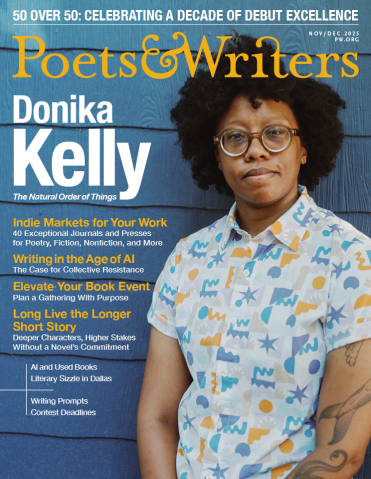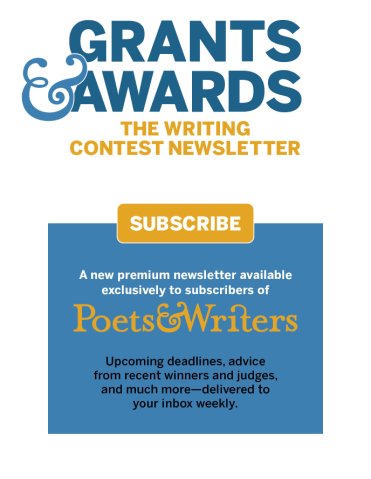Willamette University and Pacific University have announced plans to merge into a new private university system, according to Oregon Public Broadcasting. If the merger goes through, the proposed new system, tentatively called the University of the Northwest, would become the state’s largest private university with more than 6,000 students. Both Willamette and Pacific universities currently have low-residency MFA programs in creative writing. “Higher education institutions across the country are facing declining enrollment and budget difficulties, but leaders at Pacific and Willamette say they’re not pursuing the partnership due to financial challenges. They say the partnership will lead to better services and expanded career pathways for students, as well as create a regional workforce development hub.”
Writers Recommend
Writing Prompts
-
It’s that time of year to send and receive holiday cards, some of which may include a family...
-
In many holiday movies and holiday-themed episodes of popular TV series, a clashing of traditions...
-
“It was happily free of theoretical ambitions, such as being avant-garde or radical or even funny...
Tools for writers
Daily News
Darrell Kinsey is the winner of the Center for Fiction’s 2025 First Novel Prize for Natch (University of Iowa Press). “Joseph Earl Thomas, author of the 2024 First Novel Prize–winning novel God Bless You, Otis Spunkmeyer, presented Kinsey with the award, which carries with it a prize of $15,000.”
Elaina Richardson is stepping down as president of the artist and writers retreat Yaddo, the New York Times reports. She has held the post for twenty-five years, during which time “she has increased Yaddo’s endowment from $8 million to $38 million and overseen significant upgrades to the 400-acre former summer home of Spencer and Katrina Trask, a financier and a writer who, after the deaths of their four young children, bequeathed their estate to artists seeking respite from the demands of everyday life.”
Oxford University Press has sold its New York City offices on Madison Avenue for $40 million, Publishers Weekly reports. “The sale comes just one week after Scholastic announced the sale of its own Manhattan headquarters, in addition to its primary warehouse located in Jefferson City, Mo., and plans to lease back part of the properties. Net proceeds for the Scholastic deal are expected to top $400 million.”
The second annual State of Reading Report, compiled by Social reading app Fable and digital subscription service Everand using the reponses of more than 1,600 users, shows that people “are finding increasing ways to weave reading into daily life,” with 64 percent of eighteen- to twenty-four-year-olds reading more; “audiobooks have overtaken ebooks as the top digital format, and smartphones are the top device”; readers’ comfort level with and usage of AI has risen but people still trust humans more; and fantasy titles such as Onyx Storm, Iron Flame, and Fourth Wing topped the most-read list among users.
The U.S. Supreme Court will not consider Leila Green Little et al. v. Llano County, a book removal case in Texas “that jeopardizes First Amendment rights in public libraries,” according to Publishers Weekly. It would have been the first book-banning case to be heard by the court since 1982. The original lawsuit, filed in April 2022 by seven library patrons in Llano, Texas, was filed after seventeen books were removed from the Llano branch library. “Publishers, librarians, and literary organizations had petitioned SCOTUS for a writ of certiorari, the process by which SCOTUS decides whether to take a case, but to no avail.” One of the plantiffs, Leila Green Little, wrote in an e-mail to Publishers Weekly, “This means we now live in a censorship state.”
The Whiting Foundation is partnering with the Brooklyn-based literary public relations firm Press Shop PR to “provide strategic publicity guidance to this year’s awardees” of the Nonfiction Grant for Works-in-Progress, Publishers Weekly reports. The 2025 grantees are Paul Bogard, Jason Cherkis, S.C. Cornell, Caitlin Dickerson, Elena Dudum, Grace Elizabeth Hale, Will Harris, Alex Marzano-Lesnevich, Avi Steinberg, and Raksha Vasudevan.
Netflix says book adaptations are driving viewership, according to Katy Hershberger of Publishers Lunch. “In 2025...adaptations amassed more than 4.5 billion views around the world for movies and series including Frankenstein, The Woman in Cabin 10, The Hunting Wives, The Thursday Murder Club, and Ransom Canyon, and book-to-screen content has been in the streamer’s global Top 10 list every week this year.”
Novelist Elif Shafak has been named the new president of the UK’s Royal Society of Literature, the Guardian reports. Shafak, who has been vice president since 2020, takes over from Bernardine Evaristo, who is nearly finished with her four-year term.
László Krasznahorkai, the Hungarian author who won the 2025 Nobel Prize in literature, gave a lecture in Stockholm on Sunday in a rare public appearance, the Los Angeles Times reports. “He introduced his lecture, according to the English translation, by saying that ‘on receiving the 2025 Nobel Prize in Literature, I originally wished to share my thought with you on the subject of hope, but as my stories of hope have definitely come to an end, I will now speak about angels.’” The seventy-one-year-old writer described new angels as “wingless, messageless beings among us searching for human recognition.”
The notebooks of French novelist and philosopher Albert Camus have been published as a single volume for the first time, offering an unprecented glimpse into the thinking of the intensely private writer, the New York Times reports. Not to be confused with personal diaries, the notebooks contain the writer’s preparatory musings for such works as The Stranger and The Fall and include “explorations not just of the absurdity of existence but of isolation, guilt, redemption and resilience.” Other commentary is less searching and more candid: “‘I always wonder why I attract socialites,’ he wrote in 1949. ‘All those hats!’”
Following Valsoft’s recent acquisition of Above the Treeline (ATL), developer of the catalog platform Edelweiss, ATL has started to implement price increases on publishers using the digital cataloging service, negatively impacting small and big presses alike, reports Publishers Weekly. “…[T]hese changes in prices have made it difficult to carry out the vital task of ensuring independent bookstores can access the information they need on our full portfolio of titles,” notes one anonymous sales director with a big New York City publisher. Industry members are discussing the possibility of a new competitor coming along that can match the work of Edelweiss for cheaper.
In an interview with the BBC’s Big Boss Interview podcast, James Daunt, founder of the British bookstore chain Waterstones and current CEO of Barnes & Noble, spoke to the place of AI-authored titles on a bookshop’s shelf. “Do I think that our booksellers are likely to put those kind of books front and center? I would be surprised,” Daunt said, but noted that Waterstones would stock “what publishers publish” so long as books using artificial intelligence were clearly labeled, and so long as readers wanted them, the BBC reports.
The Institute of Museum and Library Services (IMLS) will reinstate grants that had been terminated earlier this year by the Trump administration, NPR reports. The turn comes after attorneys general in twenty-one states filed lawsuit against the executive order that led to the termination of the grants; in November, a Rhode Island District Court judge ruled this action unlawful, releasing funds “that had been stuck in a months-long limbo.” Sam Helmick, president of the American Library Association, called the development a “massive win” for libraries in all states, but noted that “the fight is not finished,” as the administration may appeal the ruling and IMLS funding remains subject to congressional approval.
Spotify Wrapped is now offering audiobook listening hours and other personalized data, USA Today reports. “It’s been two years since Spotify began offering fifteen monthly audiobook listening hours under its Premium Plan. Last year, the streaming giant released the top global titles and authors. This year, you can see your reading analyzed alongside your music in Wrapped.”
Porter Anderson, the editor in chief of Publishing Perspectives, has died. Anderson led Publishing Perspectives since 2016. In 2019 he was awarded International Trade Press Journalist of the Year at the London Book Fair. He also cofounded the Hot Sheet newsletter, now known as the Bottom Line, with Jane Friedman.
For the Los Angeles Times, six writers remember Joan Didion for what would have been her 91st birthday. “The more I read Joan, the more I understand that without realizing it, perhaps, she was a philosopher of sorts—largely about the American arrival myth, and what that dream looks like, or doesn’t look like,” Hilton Als says.
Wyatt Williams writes in the New York Times Magazine about the new film adaptation of Denis Johnson’s Train Dreams, which arrives just as a new biography of the writer, Ted Geltner’s Flagrant, Self-Destructive Gestures, is published by the University of Iowa Press. “The biography shines an uncomfortably bright spotlight on an author who often chose to remain half in the shadow. Geltner’s reporting demystifies the troubled period of Johnson’s life that shaped Jesus’ Son and leaves the reader with, among other things, a set of damning facts. They present a portrait of a man who...had good reason to be haunted by what he had done. That understanding may even change how we read Johnson’s last, enigmatic novella.”
PEN America will honor best-selling author Ann Patchett with the PEN/Audible Literary Service Award at its annual gala on May 14, 2026. The organization will also honor Oscar-nominated film producer Jason Blum, founder and CEO of Blumhouse, with the Business Visionary award.
The British Ukrainian writer Marina Lewycka was posthumously awarded the Vintage Bollinger prize, a special award marking the twenty-fifth anniversary of the Bollinger Everyman Wodehouse prize for comic fiction, the Guardian reports. Lewycka, who died last month at the age of 79, won the award for her 2005 novel, A Short History of Tractors in Ukrainian.
Literary Events Calendar
- December 11, 2025
El Martillo Press at City Lights Bookstore
City Lights Bookstore6:00 PM - 8:00 PM - December 11, 2025
The Autobiography of Malcolm X with Jelani Cobb
Symphony Space7:00 PM - 8:15 PM - December 11, 2025
Zoom: Broadsides & Ephemera feat. John Burroughs
Loganberry Books7:00 PM - 8:30 PM
Readings & Workshops
Poets & Writers Theater
Most Recent Items
Classifieds
Writing contests, conferences, workshops, editing services, and more.
Jobs for Writers
Search for jobs in education, publishing, the arts, and more.










